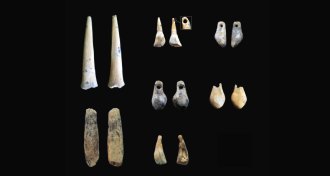News
-
 Humans
HumansHere’s what makes satire so funny, according to science
Analysis of headlines from the satirical newspaper The Onion could help you — or a computer — write humorous news headlines.
-
 Physics
PhysicsLasers could send messages right to a listener’s ear
Communication in noisy environments or dangerous situations could one day rely on lasers.
-
 Planetary Science
Planetary ScienceTitan’s oddly thick atmosphere may come from cooked organic compounds
Saturn’s moon Titan might get some of its hazy atmosphere by baking organic molecules in a warm core.
-
 Climate
ClimateClimate change might not slow ocean circulation as much as thought
New measurements may call for a rethink of what controls ocean circulation in the North Atlantic.
-
 Planetary Science
Planetary ScienceNASA’s Curiosity Mars rover weighed the mountain it’s climbing
Curiosity measures gravity as it drives, allowing scientists to weigh Mount Sharp and determine that the rock is less dense than expected.
-
 Genetics
GeneticsThis bacteria-fighting protein also induces sleep
A bacteria-fighting protein also lulls fruit flies to sleep, suggesting links between sleep and the immune system.
-
 Animals
AnimalsGiant pandas may have only recently switched to eating mostly bamboo
Giant pandas may have switched to an exclusive bamboo diet some 5,000 years ago, not 2 million years ago as previously thought.
By Jeremy Rehm -
 Neuroscience
NeuroscienceNo, we don’t know that gum disease causes Alzheimer’s
A recent study linked gum disease and Alzheimer’s disease, but the results are far from conclusive.
-
 Anthropology
AnthropologyNew dates narrow down when Denisovans and Neandertals crossed paths
Mysterious ancient hominids called Denisovans and their Neandertal cousins periodically occupied the same cave starting around 200,000 years ago.
By Bruce Bower -
 Health & Medicine
Health & MedicineChinese ‘tweets’ hint that happiness drops as air pollution rises
A study of more than 210 million social media posts reveals a link between people’s sense of well-being and pollution.
By Sujata Gupta -
 Planetary Science
Planetary ScienceThe latest picture of Ultima Thule reveals a remarkably smooth face
Kuiper Belt object MU69, nicknamed Ultima Thule, is largely unmarred by impact craters, suggesting the Kuiper Belt might lack small objects.
-
 Earth
EarthEarth’s core may have hardened just in time to save its magnetic field
Earth’s inner core began to solidify sometime after 565 million years ago — just in time to prevent the collapse of the planet’s magnetic field, a study finds.